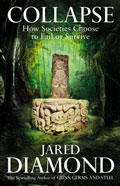| Book Review |
Collapse
Topic status automatically displays here - do not remove.

|
Title: |
Collapse—How Societies Choose to Fail or Survive |
|
Author/Editor: |
Jared Diamond; |
|
|
Publisher/Country: |
Allen Lane/Penguin Books; USA |
|
|
ISBN: |
0713992867 (paperback) |
|
|
Edition: |
First Edition 2005 |
|
|
Rating: |
8 out of 10 |
|
Collapse as its subtitle states is the story of how societies choose to fail or survive. It explores the reasons for the collapse of several past societies, and draws some analogies with our current societies. Jared Diamond is greatly concerned about our future, and makes some dire warnings. However, as he alludes, unlike the people of past civilizations, we now live in the age of communication where we have access to extensive written history of societies other than our own. As well as historians, we also have archaeologists, climatologists, paleontologists (studying prehistoric life forms), palynologists (studying flora pollen counts and types) and other scientific workers which we can use to piece together the history of societies which left us with little or no written record of their demise. As Diamond states: "The past offers us a rich database from which we can learn, in order that we may keep on succeeding."'Collapse' explores and explains the possible and likely reasons for the collapse of ancient societies including Easter Island, Pitcairn Island, Henderson Island, the Anasazi Indians, the Mayan empire, Vinland Vikings, and Greenland Norse. In contrast, Diamond explores the reasons for the success of other ancient societies including New Guinea highlanders, Polynesian Tikopea islanders, and Japanese Tokugawa islanders. Not surprisingly, human impact on their surrounding environment appears to have directly contributed to the collapse of their society. Diamond has identified eight common processes through which past societies have undermined themselves. These include:
The relative importance of the type of impact differs from case to case, however, as Diamond states: "Those past collapses tended to follow somewhat similar courses ... Population growth forced people to adopt intensified means of agricultural production ..." |
"Unsustainable practices led to environmental damage of
one or more of the eight types just listed."
Consequences included food shortages, starvation, wars between local inhabitants and with neighbouring regions, and the overthrow of governments by disillusioned masses. You may consider that the decline of an advanced society would occur over an extended period of time of gradual decline, however, Diamond found that: "they declined rapidly after reaching peak numbers and power ... In the worst cases of complete collapse, everybody ... emigrated or died."'Collapse' conveys the message that unintended ecological suicide—ecocide—has now overshadowed nuclear war and diseases (AIDS, SARS) as the greatest threat to global civilization: "The environmental problems facing us today include the same eight that undermined past societies, plus four new ones:
Most of these 12 threats, it is claimed, will become globally critical within the next few decades: either we solve all the problems by then, or they will resolve themselves—to our detriment. Diamond sums up: "Thus, we have the opportunity to learn from the mistakes of distant peoples and past peoples. My hope in writing this book has been that enough people will choose to profit from that opportunity to make a difference."'Collapse' provides the bigger picture for us to place ourselves in context. It should be compulsory reading for society decision-makers including all levels of government, politicians, business leaders, and environmental and community groups. I would recommend this book to lateral thinkers and citizens concerned about our impact on the environment and about the decisions that we make as a society. What kind of future are we shaping for our children to inherit? Colin Ramsden, May 2005. |
See Also
 More Book Reviews |
More Book Reviews |
 Lotech Solutions' Tips, Tricks,
and Procedures
Lotech Solutions' Tips, Tricks,
and Procedures

Copyright Lotech Solutions. All rights reserved.
 Bookmark this topic
Bookmark this topic email webmaster
email webmaster